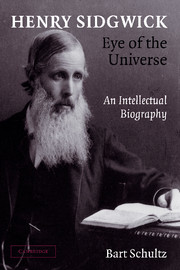1 - Overture
Published online by Cambridge University Press: 09 July 2009
Summary
My aim in what I am about to say now is to give such an account of my life – mainly my inner intellectual life – as shall render the central and fundamental aims that partially at least determined its course when apparently most fitful and erratic, as clear and intelligible as I can. That aim is very simply stated. It has been the solution, or contribution to the solution, of the deepest problems of human life. The peculiarity of my career has been that I have sought light on these problems, and that not casually but systematically and laboriously, from very various sources and by very diverse methods.
Henry Sidgwick, “Autobiographical Fragment” dictated from his deathbedStranger lives than Henry Sidgwick's have resulted from the philosophical quest for the ultimate truth about the Universe, but his is nonetheless a source of considerable fascination. As a Victorian philosopher, social scientist, literary critic, educator, reformer, and parapsychologist, an academic who spent nearly his entire adult life teaching at and reforming Cambridge University, Sidgwick was at the philosophical heart of England when England was at the height of its worldly power. He was friendly with everyone from William Gladstone to George Eliot, had in one brother-in-law a future prime minister and in another a future archbishop of Canterbury, and served as a leading figure in that most famous of elite secret discussion societies, the Cambridge “Apostles,” which would go on to give the world the Bloomsbury circle and the Cambridge spies.
- Type
- Chapter
- Information
- Henry Sidgwick - Eye of the UniverseAn Intellectual Biography, pp. 1 - 20Publisher: Cambridge University PressPrint publication year: 2004

